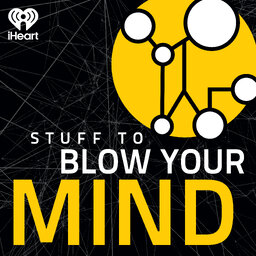Beyond this Vale of Testing: Post-Empirical Science
Most scientists declare empirical falsifiability -- the notion that a theory may be proven right or wrong via scientific investigation -- to be the core principle of science. Others, such as string theorists, think science should move beyond those boundaries. Is empiricism an unnecessary straight jacket? Is “post-empirical science” an oxymoron? Robert and Joe explore in this episode of the Stuff to Blow Your Mind podcast.
Learn more about your ad-choices at https://www.iheartpodcastnetwork.com
In 1 playlist(s)
Stuff To Blow Your Mind
Deep in the back of your mind, you’ve always had the feeling that there’s something strange about re…Social links
Follow podcast
Recent clips

Weirdhouse Cinema Rewind: The Telephone Box
1:19:53

From the Vault: Mystery Cults, Part 3
1:03:47

Weirdhouse Cinema Rewind: Forbidden Planet
1:34:55
 Stuff To Blow Your Mind
Stuff To Blow Your Mind